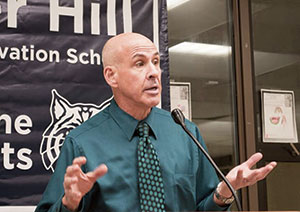
DMH Medical Director David Hoffman explained the intricacies of accurately assessing the suitability for patient placement in group homes such as the Central St. facility to attendees at the latest public safety meeting on the matter last week.
By Douglas Yu
Vinfen outlined an improved action plan to make sure Somerville residents’ safety at the latest public safety meeting on the matter at Winter Hill Community School on Dec. 2.
The action plan resulted from the demand within the neighborhood after an assault by one of the facility’s residents occurred last month. The incident involves a woman who was brutally attacked by the 35-year-old Allen Harmon, a resident of the Central Street group home. Vinfen, a health and human service organization, owns 15 group homes throughout Cambridge and Somerville, and the Central Street group home is one of them.
At the recent meeting, Vinfen reportedly promised to remove all the short-term residents in their group home on Central Street to somewhere else. Vinfen’s CEO, Bruce Bird apologized to the Winter Hill residents at the meeting for the company not involving itself with the community as it could have, and also admitted their negligence since Vinfen received the complaints against Harmon a week before the incident.
Patricia Kenny, Area Director of Department of Mental Health (DMH), said, “We are implementing an audit process in order to respond to residents’ questions regarding who inspects the group homes and who does the ongoing assessment to Vinfen’s clients.”
The audit process includes the review of mental status changes, the training related to identification and reporting risk, and staff supervision among other things.
“We are also reducing the census in the house [Central Street group home],” Kenny said. “It has been a concern. It’s one of the few programs that has double bedrooms. So the rooms will be automatically trimmed down to census of six instead of what was 12, and there will be single bedrooms.” Kenny also mentioned that they were still in the process of removing those short-term residents. Currently, there are nine residents in the Central Street group home.
One of the Winter Hill residents questioned if there would be any tenants with criminal records living at the facility once the census comes down to six. Kenny said all six of the clients have been assessed and are clinically stable enough to live there.

DMH Area Director Patricia Kenny and Vinfen CEO Bruce Bird fielded questions and updated concerned attendees on the immediate plans for the Central St. Group home.
>~Photos by Douglas Yu
Bird announced to the residents at the meeting that there would be additional staff at the group home over the weekends and overnight to supervise their clients.
“We’ve asked staff to be vigilant for any signs of disruptive client activity, including publicly drinking alcohol, trespassing, panhandling and littering. We’ve asked them to make observations for those reports,” Bird said. “But since the last meeting, we haven’t heard of any incident from the Central Street group home.”
Bird did mention that there was a tenant from another Vinfen property who wandered into a neighbor’s yard recently.
Other than reducing the capacity of the group home and improving on-site supervision and support, Vinfen’s action plan for their Central Street group home also includes continuous collaboration with Somerville police, quality reviews, community engagement and oversight changes.
Winter Hill resident Samuel Acevedo cited two other tragic incidents involving Vinfen clients in 2009 and 2012. He shared his concern that more incidents will happen in the future, because it is a systemic issue.
“What I don’t see is any mention of consequences, should there be any deviance from the plan,” Acevedo said. “A, what trigger the consequences? B, who would face the consequences?” Acevedo asked.
“If we have a failure in the system, whether it’s a clinical system or whatever, we really work with the department and with anybody else that’s involved, and try to figure out if we should make corrections. And we do that all the time,” Bird responded to Acevedo.
Kenny also responded to Acevedo saying that the threshold is “not meeting the terms of the contract,” and that Vinfen’s action plan is “above and beyond the contract, and it’s a higher standard.”
David Hoffman, Medical Director of DMH in Metro Boston Area, addressed the difficulty of assessing the patients and making decisions regarding who are qualified to live in the group homes.
“For people with assault and battery, for example, that can mean so many things,” Hoffman said. “It could mean a brutal assault on a spouse. It could mean shoving a policeman who asked you to leave McDonalds when you were creating a disturbance. The reality is that we cannot predict things all the time, and we can only use our best judgment.”
Hoffman said that some patients with criminal backgrounds could still get the referrals to live in a group home.
“You are looking at the likelihood of something happening again, but you also look at the severity of the type of thing that might happen again,” Hoffman said. “Someone with one percent chance of murdering someone again, we feel it’s riskier than someone with 20 percent chance of minor assault again.”
It was noted that Harmon, who attacked the woman in Winter Hill, has a long criminal history of violence.
Bird avoided going into details of the assault case that happened last month because of confidentiality after a resident claimed that he knew about Harmon’s drinking issue and questioned why counselors in the Central Street group home did not notice it earlier.
“We weren’t seeing those signs as much in the house as you were seeing in the community,” Bird said, while explaining that he was not blaming the community. “It’s our fault for not having the communication system in the community,” he said.
Agreement was evident throughout the meeting room as Acevedo said that those in control should be equipped to see what the community does not see.
“There should be warning signs,” Acevedo said. “In this case, we all depend on DMH and other government departments.”
Kenny said the Commonwealth of Massachusetts recently received some federal funding to expand the community resources to help those who are in need to recover.
“There are a lot of people sitting in hospitals, but they don’t need to be in hospitals, because we don’t have enough community resources,” Kenny said. “In the next six to eight months, we’ll be adding 160 community placements for those people.”
Bird promised the Winter Hill residents that Vinfen’s staff has a pretty good understanding of their clients. But he added, “Sometimes people in the program are behaving very different there than they are in the community.”
“That’s one of the issues that we hope the new communications system can deal with,” Bird said, referring to the daily review of the all the clients in the Vinfen group homes that has been added to ensure the safety of the neighborhood.













Reader Comments